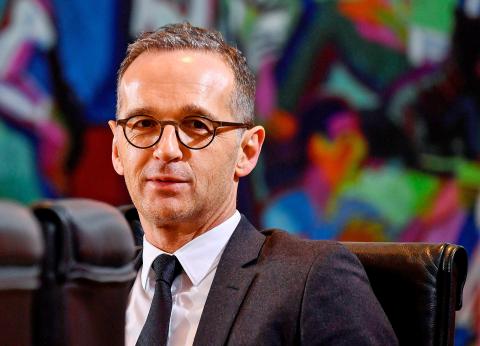German Minister of Foreign Affairs Heiko Maas on Wednesday last week voiced his opposition to China’s threat of using military force, making him the highest-ranking foreign official to speak out against Beijing’s Taiwan policy in several years.
Wong Ming-hsien (翁明賢), a professor at Tamkang University’s Graduate Institute of International Affairs and Strategic Studies, on Saturday said that Maas’ remarks are part of German efforts to counter China’s rise as the EU becomes increasingly aware of the problems resulting from Beijing’s growing influence in the world.
Maas made the remarks at the German Bundestag, after Germany-Taiwan Parliamentary Friendship Group Chairman Klaus-Peter Willsch, a Christian Democratic Union lawmaker, asked him about Chinese President Xi Jinping’s (習近平) Jan. 2 speech.

Photo: AFP
In an address in Beijing on the 40th anniversary of the “Message to Compatriots in Taiwan,” Xi said that he would not renounce the use of force against foreign forces and pro-Taiwanese independence “separatists” that interfere with China’s goal of peaceful unification as he announced plans to explore a Taiwanese version of the “one country, two systems” model.
The German government would make clear, as it has in the past, that it disagrees with Beijing’s threat of military force against Taiwan, Maas said.
China has at least once persuaded individual EU members to block proposals about Taiwan that have come before the Council of the EU’s Foreign Affairs Council, he said, adding that he hoped the EU would adopt majority rule, instead of requiring unanimity, and share Germany’s stance on issues related to Taiwan.
Germany has always believed in resolving cross-strait issues by peaceful means, German Minister for European Affairs Michael Roth said in a written response to the session.
Cross-strait dialogues should take place based on mutual respect, and the “status quo” should not be changed unless both sides agree, he added.
Commenting on Maas’ remarks, Wong said that China, in its rise, has been responsible for many problems worldwide, such as Beijing’s crackdowns on human rights in China’s Xinjiang Uighur Autonomous Region and Tibet, as well as alleged attempts to gather intelligence from other governments through Huawei Technologies Co.
Beijing’s “Made in China 2025” plan and Germany’s “Industry 4.0” plan are mutually exclusive, and although China is Germany’s third-biggest market, the German government would not allow their trading partnership to affect its foreign policies, he said.
Germany’s attempts to counter China’s rise can be in part attributed to efforts by the nation’s representative offices abroad, he said.
As Germany is a federal republic, the Taiwanese government should consider promoting Taiwan through enhanced civic exchanges with local governments in Germany, he added.

Alain Robert, known as the "French Spider-Man," praised Alex Honnold as exceptionally well-prepared after the US climber completed a free solo ascent of Taipei 101 yesterday. Robert said Honnold's ascent of the 508m-tall skyscraper in just more than one-and-a-half hours without using safety ropes or equipment was a remarkable achievement. "This is my life," he said in an interview conducted in French, adding that he liked the feeling of being "on the edge of danger." The 63-year-old Frenchman climbed Taipei 101 using ropes in December 2004, taking about four hours to reach the top. On a one-to-10 scale of difficulty, Robert said Taipei 101

Nipah virus infection is to be officially listed as a category 5 notifiable infectious disease in Taiwan in March, while clinical treatment guidelines are being formulated, the Centers for Disease Control (CDC) said yesterday. With Nipah infections being reported in other countries and considering its relatively high fatality rate, the centers on Jan. 16 announced that it would be listed as a notifiable infectious disease to bolster the nation’s systematic early warning system and increase public awareness, the CDC said. Bangladesh reported four fatal cases last year in separate districts, with three linked to raw date palm sap consumption, CDC Epidemic Intelligence

US climber Alex Honnold left Taiwan this morning a day after completing a free-solo ascent of Taipei 101, a feat that drew cheers from onlookers and gained widespread international attention. Honnold yesterday scaled the 101-story skyscraper without a rope or safety harness. The climb — the highest urban free-solo ascent ever attempted — took just more than 90 minutes and was streamed live on Netflix. It was covered by major international news outlets including CNN, the New York Times, the Guardian and the Wall Street Journal. As Honnold prepared to leave Taiwan today, he attracted a crowd when he and his wife, Sanni,

Taiwanese and US defense groups are collaborating to introduce deployable, semi-autonomous manufacturing systems for drones and components in a boost to the nation’s supply chain resilience. Taiwan’s G-Tech Optroelectronics Corp subsidiary GTOC and the US’ Aerkomm Inc on Friday announced an agreement with fellow US-based Firestorm Lab to adopt the latter’s xCell, a technology featuring 3D printers fitted in 6.1m container units. The systems enable aerial platforms and parts to be produced in high volumes from dispersed nodes capable of rapid redeployment, to minimize the risk of enemy strikes and to meet field requirements, they said. Firestorm chief technology officer Ian Muceus said